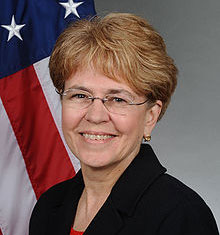
PL 1: Opening Plenary Session
Sunday, August 5, 5-6:30 pm
Oregon Convention Center, Oregon Blrm 201-203
Keynote Speaker: Jane Lubchenco, Under Secretary of Commerce for
Oceans and Atmosphere and Administrator of NOAA
Are we waiting for Godot? Waiting for a global solution is not
the answer.
Lecture dedicated to Elinor Ostrom.

Jane Lubchenco earned a Ph.D. in ecology from Harvard and joined the faculty. She gave up her tenure-track job after two years to move to Oregon State so she could split a full-time professorship with her husband, ecologist Bruce Menge, and have more time with her children. She eventually went full time and has garnered awards that include a MacArthur Foundation fellowship, a Pew Marine Fellowship and the Heinz Award for the Environment. She is also past president of the American Assn. for the Advancement of Science, the International Council for Science and the Ecological Society of America.
Dr. Lubchenco's core expertise is marine ecology; most recently she led an examination of a newly emerging low-oxygen "dead zone" off the Oregon coast. Besides her own research, she was a member of the Pew Oceans Commission, one of two national panels that declared the oceans in poor health and offered hundreds of remedies.
Dr. Lubchenco was appointed the head of the NOAA (National Oceanic and Atmospheric Administration) in 2009 by President Barak Obama as a part of his new “Science Team”. NOAA is the nation’s top science agency for climate, oceans, and atmosphere. It has a staff of 12,800 employees, a budget of $4 billion, and is responsible for predicting changes in the Earth’s environment from the depths of the ocean to the surface of the sun as well as managing and conserving our marine and coastal resources. Being elected as the undersecretary of commerce for oceans and atmosphere, Dr. Lubchenco is both the first woman and the first marine ecologist to occupy the post, which had also been vacant for fourteen years previous to her appointment. This post is her current focus today and she has been the guiding force for it through disasters such as the BP oil spill. Her current goals as the head of the NOAA include reorienting how the nation responds to environmental issues like rising seas and decreasing fish stocks, to strengthen scientific research and make it more relevant to society, as well as to improve the health of ecosystems and coastal communities.
PL 2: Scientific Plenary & ESA Awards Session
Monday, August 6, 8-10 am
Oregon Convention Center, Oregon Blrm, 201-203
Keynote Speaker: Jerry F. Franklin, University of Washington, Seattle
Forests, Fish, Owls, Volcanoes . . . and People: Reflections on
fifty
years of accumulated ecological knowledge and its
application to policy

Professor with the College of Forest Resources at the University of Washington is sometimes referred to by the media as the "guru of old growth." His mission in life is to "cut the best deal I can for forests and trees in a world that's dominated by humans."
Jerry is credited with modifying the way trees are harvested. These new techniques have helped retain biodiversity in many of the world's forests. His love for the woods surfaced at the early age of four and by age nine he knew he would grow up to be a forester. Even today, Jerry often can be found wandering in the forest whistling and "talking" to his 500 year-old Douglas Fir "friends."
PL 3: Recent Advances Lecture
Wednesday, August 8, 12:15pm-1:15pm
Oregon Convention Center, Portland Blrm
Presider: Brian McCarthy, ESA Program Chair
Guest Lecturer: Nancy Turner, University of Victoria.
“Since Time Immemorial”: Recognizing Indigenous Environmental
Knowledge in Land and Resource Management

Nancy is an ethno botanist, ethnoecologist and professor in the School of Environmental Studies, at the University of Victoria. She started learning about indigenous peoples and plants as an undergraduate student at University of Victoria in 1968, working with Saanich First Nations elders. Her doctoral work at UBC concentrated on plant classification systems of Haida, Nuxalk (Bella Coola) and Stl'atl'imx (Lillooet) peoples. Her major research contributions have been in demonstrating the pivotal role of plant resources in past and contemporary aboriginal cultures and languages, as an integral component of traditional knowledge systems, and how traditional management of plant resources has shaped the landscapes and habitats of western Canada.





 phone 202-833-8773
phone 202-833-8773